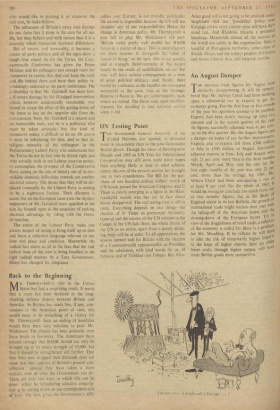UN Testing Point
ill: Seventeenth General Assembly of the
M
United Nations, just opened, is shrouded more in uncertainty than in the now-fashionable British gloom. Though the ideas of Development Decade and 1963 as UN Year for International Co-operation may still seem more pious hopes than anything likely to lead to solid achieve- ments, the eve of the present session has brought one or two consolations. The Bill for the pur- chase of one hundred million dollars' worth of UN bonds passed the American Congress. and U Thant is clearly emerging as a figure in the Ham- marskjold mould who has yet to face direct Soviet disapproval. The real testing time is still to conic. Everything depends on two things-- the election of U Thant as permanent Secretary- General and the success of the UN mission in the Congo. If the UN fails there, the whole future of the UN as an active, apart from a purely debat- ing, body will be at stake. To all appearances, the session opened well for Britain with the election of a Commonwealth representative as President and the admission, with kind words for us, of Jamaica and of Trinidad and Tobago. But Afro- Asian good will is not going to be retained easily. Suspicions that our 'possibilist.' policy • over Katanga covers more sinister aims will have then' usual run. And Rhodesia remains a perennial handicap. Meanwhile almost all the nations of the world are safely in the organisation. Only 3 handful of Portuguese territories, some areas of British Africa, and the subject peoples of Chinese and Soviet Central Asia. still languish outside. -










































 Previous page
Previous page